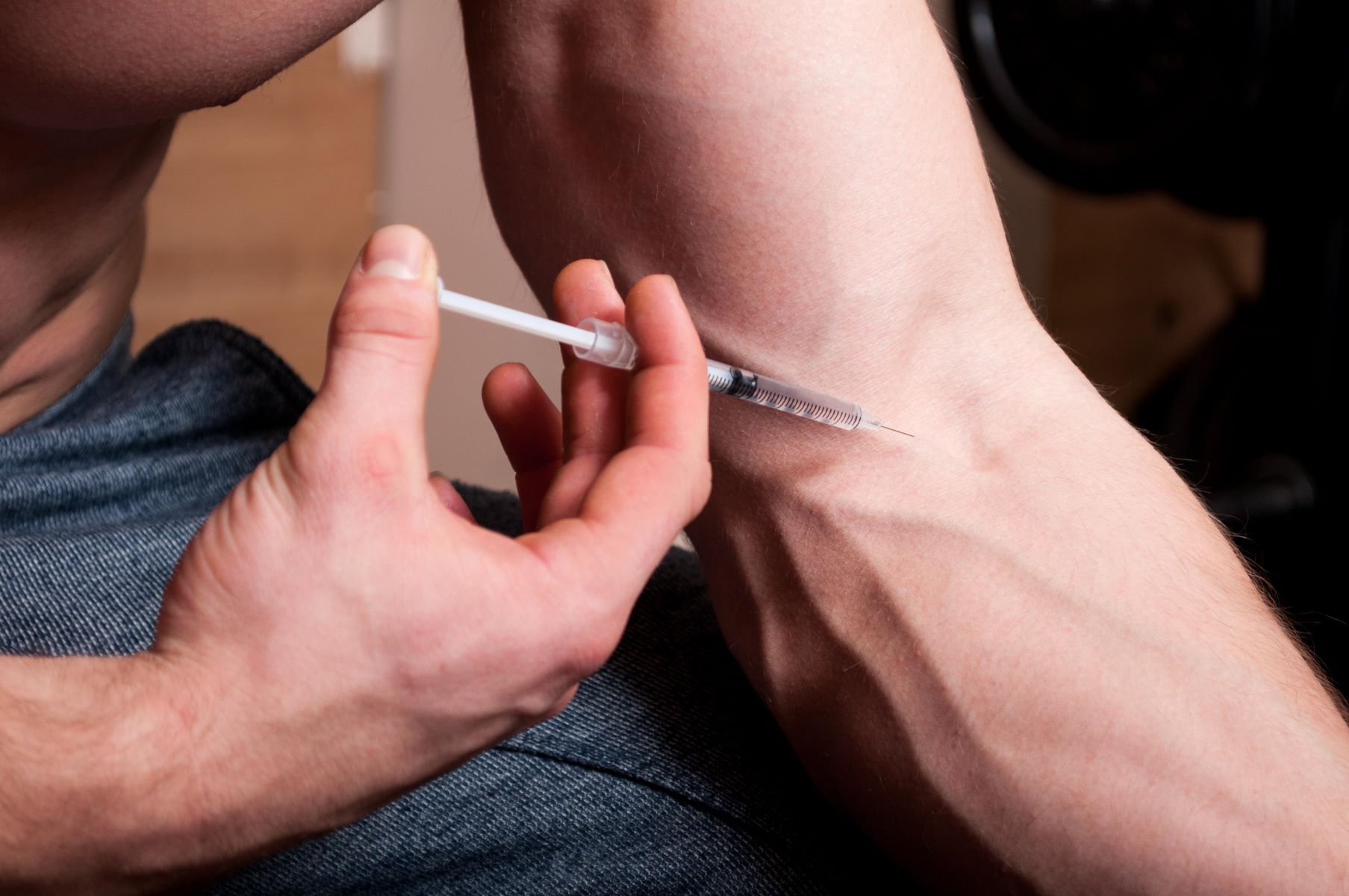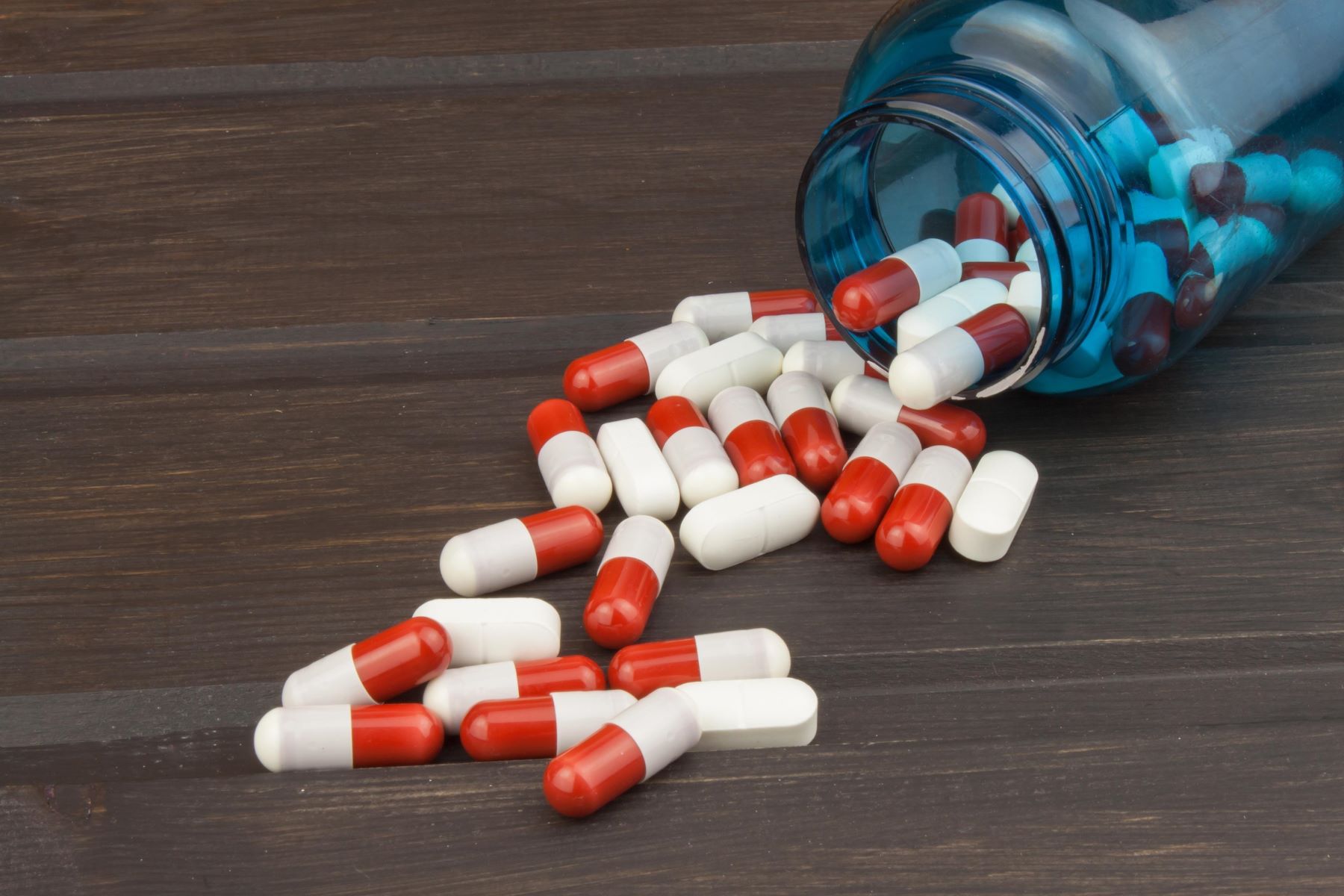Home>Misc>Featured>How Does Growth Hormone Improve Athletic Performance


Featured
How Does Growth Hormone Improve Athletic Performance
Modified: August 19, 2023
Discover how growth hormone can enhance athletic performance with our featured article. Learn about its benefits, risks, and effectiveness in improving strength and endurance.
Introduction
Athletic performance has always been a subject of fascination and intense pursuit for athletes across various sports. The desire to push one’s limits, gain a competitive edge, and achieve optimal performance has led athletes to explore various means of enhancing their abilities. One such avenue of interest is the use of growth hormone.
Growth hormone, also known as somatotropin, is a natural hormone produced by the pituitary gland. It plays a crucial role in the growth and development of the human body, but its effects extend beyond that. In recent years, there has been growing interest in understanding how growth hormone can potentially improve athletic performance.
Before delving into the mechanisms of growth hormone and its effects on athletic performance, it’s important to note that the use of growth hormone for performance enhancement is subject to regulations and restrictions. The World Anti-Doping Agency (WADA) and other sporting bodies strictly prohibit the use of growth hormone for non-medical purposes. This article aims to provide an overview of the potential effects, both positive and negative, that growth hormone may have on athletic performance.
It is worth mentioning that the use of growth hormone in athletics is a highly controversial and complex topic. While some athletes may pursue growth hormone for potential performance benefits, it is essential to approach the subject with caution and consider both the ethical implications and potential risks.
Now, let us explore the mechanisms through which growth hormone may potentially enhance athletic performance, including increased muscle strength and mass, enhanced exercise capacity, accelerated recovery and injury healing, improved metabolism, and psychological effects.
Understanding Growth Hormone
Growth hormone, or somatotropin, is a hormone produced by the pituitary gland, located at the base of the brain. It is an essential hormone for growth and development throughout childhood and adolescence. However, its role extends beyond the growth phase and into adulthood.
Growth hormone is responsible for regulating various physiological processes in the body, including metabolism, cell repair and regeneration, and immune function. It is also involved in the development and maintenance of muscle mass and bone density. The release of growth hormone is regulated by the hypothalamus, which produces and releases growth hormone-releasing hormone (GHRH).
The secretion of growth hormone follows a pulsatile pattern, with higher levels released during periods of deep sleep and exercise. This pulsatile release is essential for the body to receive optimal benefits from growth hormone.
Several factors can influence growth hormone production, including sleep quality, stress levels, exercise intensity, and nutritional status. Additionally, certain medical conditions and medications can impact growth hormone levels in the body.
The effects of growth hormone are mediated through the interaction with specific receptors located on various tissues throughout the body. When growth hormone binds to its receptors, it triggers a cascade of signals that lead to the activation of downstream pathways, ultimately resulting in the desired physiological effects.
It is important to note that while growth hormone is naturally produced in the body, it can also be administered exogenously. This can be done through the use of synthetic growth hormone, commonly known as recombinant human growth hormone (rhGH). However, the non-medical use of growth hormone for performance enhancement is illegal in most sports and is strictly regulated by anti-doping agencies.
Now that we have a basic understanding of growth hormone, let us explore the mechanisms through which it may impact athletic performance.
Mechanisms of Growth Hormone and Athletic Performance Enhancement
Understanding the mechanisms through which growth hormone may enhance athletic performance can provide valuable insights into its potential benefits. Growth hormone exerts its effects on athletic performance through various mechanisms, including increased muscle strength and mass, enhanced exercise capacity and endurance, accelerated recovery and injury healing, improved metabolism and body composition, and psychological effects.
One of the primary mechanisms through which growth hormone may enhance athletic performance is by increasing muscle strength and mass. Growth hormone stimulates the synthesis of new proteins in muscle cells, leading to muscle hypertrophy. This can result in increased muscle strength, allowing athletes to generate more force during their performance. Additionally, growth hormone promotes the regeneration of damaged muscle tissue, facilitating faster recovery from intense exercise or injuries.
Another important mechanism by which growth hormone may enhance athletic performance is through its effects on exercise capacity and endurance. Growth hormone improves the oxygen-carrying capacity of the blood by promoting the production of red blood cells and increasing the release of oxygen to the muscles. This can enhance an athlete’s endurance, allowing them to perform at high intensity for longer durations.
Furthermore, growth hormone plays a crucial role in the recovery process. It accelerates the healing of injured tissues, such as muscles, tendons, and ligaments, by promoting cell regeneration and collagen synthesis. This can reduce the downtime due to injuries and enable athletes to return to training and competition sooner.
In addition to its effects on muscle and recovery, growth hormone also influences metabolism and body composition. It stimulates lipolysis, the breakdown of stored fats, increasing the utilization of fats as an energy source during exercise. This can contribute to improved body composition, with a decrease in body fat percentage and an increase in lean muscle mass.
Lastly, growth hormone can have psychological effects that may indirectly enhance athletic performance. It can improve mood, motivation, and confidence, providing athletes with a psychological edge. Additionally, growth hormone has been linked to improved cognitive function and better sleep quality, both of which are crucial for optimal athletic performance.
While the mechanisms of growth hormone and its potential effects on athletic performance are fascinating, it is important to note that the use of growth hormone for performance enhancement is illegal and can have severe health consequences. The potential risks and side effects associated with growth hormone use in athletics will be discussed further in subsequent sections.
Increased Muscle Strength and Mass
One of the primary reasons athletes may consider the use of growth hormone is to enhance their muscle strength and mass. Growth hormone plays a vital role in muscle growth and development, both during the growth phase and in adulthood.
When growth hormone is released in the body, it stimulates the production and release of Insulin-like Growth Factor-1 (IGF-1) from the liver and other tissues. IGF-1 is a potent anabolic hormone that promotes the growth of muscle tissue. It enhances protein synthesis, leading to the formation of new muscle proteins and increased muscle fiber size. As a result, athletes may experience improved muscle strength and power.
The effects of growth hormone on muscle strength and mass are not limited to its role in protein synthesis. Growth hormone also enhances the recruitment and activation of muscle fibers during exercise. This means that athletes may be able to generate more force and utilize a higher percentage of their muscle potential when performing physical activities.
Moreover, growth hormone has been shown to reduce muscle protein breakdown, preventing muscle loss during periods of intense training or calorie restriction. By preserving muscle mass, athletes can maintain their strength and power output, even during periods of high training volume or when trying to achieve a lower body fat percentage.
It is important to note that the effects of growth hormone on muscle strength and mass may vary between individuals. Factors such as genetics, training protocols, and nutrition can influence the response to growth hormone. Additionally, the duration and dosage of growth hormone administration, if used exogenously, can also impact the outcomes.
While the potential benefits of increased muscle strength and mass can be appealing to athletes, it is crucial to highlight that the non-medical use of growth hormone for performance enhancement is illegal and carries significant risks. The misuse of growth hormone can lead to serious health complications, including cardiovascular issues, hormonal imbalances, and organ damage. Athletes should always prioritize their health and explore legal and ethical means of enhancing their performance.
Enhanced Exercise Capacity and Endurance
Growth hormone may have a significant impact on an athlete’s exercise capacity and endurance. By improving these factors, athletes can perform at higher intensities for longer durations, ultimately enhancing their overall performance.
One way growth hormone enhances exercise capacity is by increasing the production of red blood cells (RBCs) in the body. RBCs are responsible for transporting oxygen from the lungs to the muscles. With more RBCs, there is an increased delivery of oxygen to the working muscles, allowing for improved aerobic energy production. As a result, athletes may experience increased endurance and delay the onset of fatigue during prolonged exercise.
Furthermore, growth hormone enhances the release and utilization of fatty acids as an energy source during exercise. This promotes the sparing of glycogen, the body’s stored form of carbohydrates, which is crucial for endurance performance. By utilizing fats as a fuel source, athletes can preserve their glycogen stores and have a more sustained energy supply, leading to improved endurance capacity.
In addition to these metabolic effects, growth hormone also plays a role in enhancing muscle fiber recruitment and function during exercise. It improves the activation and force production of both fast-twitch and slow-twitch muscle fibers. This can result in increased power output and overall exercise performance.
Furthermore, growth hormone has been shown to improve cardiac function, including increased stroke volume (the amount of blood pumped out of the heart with each beat) and improved cardiac output (the amount of blood pumped by the heart per minute). These cardiovascular adaptations can enhance an athlete’s exercise capacity, allowing them to sustain higher intensities of exercise for a longer period.
It is important to note that the administration of growth hormone for performance enhancement is illegal in most sports and carries significant health risks. The misuse of growth hormone can lead to adverse effects on cardiovascular health, including hypertension and the development of cardiomyopathies. Athletes should focus on legal and ethical means to improve their exercise capacity and endurance, such as appropriate training programs, nutrition strategies, and recovery techniques.
Accelerated Recovery and Injury Healing
One of the potential benefits athletes seek from growth hormone usage is faster recovery from intense training sessions or injuries. Growth hormone plays a crucial role in the regeneration and repair of tissues, potentially speeding up the recovery process.
When an athlete engages in intense exercise, there is a breakdown of muscle fibers and other tissues. Growth hormone stimulates the production of new cells and tissues, facilitating the repair and regeneration of damaged muscle cells, tendons, ligaments, and other connective tissues. This can lead to faster recovery and reduced downtime between training sessions.
In addition to promoting tissue repair, growth hormone also enhances collagen synthesis. Collagen is a protein that provides strength and structure to connective tissues such as tendons and ligaments. By increasing collagen production, growth hormone may improve the integrity and resilience of these structures, allowing for faster healing of injuries and reduced likelihood of reinjury.
Furthermore, growth hormone stimulates the production and release of insulin-like growth factor-1 (IGF-1) from the liver and other tissues. IGF-1 plays a crucial role in tissue repair and healing. It promotes cell proliferation, angiogenesis (the formation of new blood vessels), and the synthesis of extracellular matrix components. These processes support the regeneration of damaged tissues and aid in the recovery from injuries.
It is important to note that while growth hormone can potentially enhance recovery and injury healing, the use of growth hormone without proper medical guidance can have serious health risks. Excess growth hormone can contribute to the development of acromegaly, a condition characterized by the enlargement of bones, soft tissues, and organs. Athletes should prioritize their well-being and seek appropriate medical care and rehabilitation strategies to ensure safe and effective recovery.
Improved Metabolism and Body Composition
Growth hormone may play a role in improving an athlete’s metabolism and body composition, factors that can directly impact performance and overall athletic success.
One way growth hormone influences metabolism is by promoting lipolysis, the breakdown of stored fats. Growth hormone increases the release of fatty acids from adipose tissue, allowing them to be utilized as an energy source during exercise. This shift in energy utilization can lead to a decrease in body fat percentage, potentially improving an athlete’s body composition.
Moreover, growth hormone has been found to increase the production of growth factors that enhance metabolism. These include insulin-like growth factor-1 (IGF-1) and insulin sensitivity factors. These metabolic hormones promote glucose uptake and utilization by muscle cells, improving overall energy metabolism and glycogen storage in the body.
In addition to its direct effects on metabolism, growth hormone can impact body composition by increasing lean muscle mass. Growth hormone stimulates protein synthesis and the formation of new muscle tissue. Through regular training and proper nutrition, athletes can capitalize on the anabolic effects of growth hormone and build lean muscle, resulting in a more toned and muscular physique.
The improvement in body composition achieved through growth hormone-induced changes in metabolism and lean muscle mass can positively impact an athlete’s performance. With a lower body fat percentage and increased muscle mass, athletes may experience improved power-to-weight ratio, leading to enhanced speed, agility, and strength.
It is important to note that the use of growth hormone for body composition enhancement is illegal in most sports and carries severe health risks if not under proper medical supervision. The misuse of growth hormone can lead to metabolic imbalances, such as insulin resistance and glucose intolerance. Athletes should focus on legal and ethical means to improve their metabolism and body composition, such as maintaining a balanced diet, proper training, and appropriate recovery strategies.
Psychological Effects of Growth Hormone on Athletic Performance
In addition to its physiological effects, growth hormone may also have psychological implications that can impact an athlete’s performance and overall well-being.
One of the potential psychological effects of growth hormone is an improvement in mood and motivation. Studies have shown that growth hormone can enhance mood and overall psychological well-being, leading to a more positive mindset. This can be particularly beneficial during periods of intense training, competition, or when facing adversity.
Growth hormone has also been linked to increased self-confidence and self-esteem in athletes. When individuals feel more confident in their abilities, they may be more willing to take risks, push their limits, and perform at their best. This can translate into improved athletic performance and a competitive advantage.
Furthermore, growth hormone has been associated with improved cognitive function. It enhances memory and cognitive processing, allowing athletes to better strategize, make quick decisions, and mentally adapt to changing situations during competition. This cognitive boost can give athletes a mental edge and improve their performance on the field or court.
Another psychological effect of growth hormone is its potential impact on sleep quality. Growth hormone plays a role in regulating sleep patterns and promoting deeper, more restorative sleep. Adequate sleep is crucial for physical recovery, muscle repair, and overall well-being. When athletes are well-rested, they can perform at their peak and have improved mental focus and concentration.
It is important to note that while growth hormone may have beneficial psychological effects, the non-medical use of growth hormone for performance enhancement is illegal and can have severe health risks. Excessive growth hormone use can disrupt the natural hormonal balance in the body and lead to mood swings, irritability, and other psychiatric issues. Athletes should prioritize their mental health and consider legal and ethical strategies to promote psychological well-being, such as engaging in stress-reducing activities, seeking counseling, and practicing mindfulness.
Potential Risks and Side Effects of Growth Hormone Use in Athletics
While growth hormone may hold potential benefits for athletes, it is essential to be aware of the potential risks and side effects associated with its use, particularly when used non-medically for performance enhancement.
One of the significant concerns with growth hormone use is its impact on cardiovascular health. Excessive growth hormone levels can lead to an increased risk of cardiovascular diseases, such as hypertension, cardiomyopathy, and atherosclerosis. Athletes should prioritize their cardiovascular health and consider the potential long-term consequences before using growth hormone.
Growth hormone abuse can also disrupt the natural hormonal balance in the body. It can lead to hormonal imbalances, including changes in the levels of other important hormones such as thyroid hormones, insulin, and cortisol. These imbalances can have significant implications on an athlete’s overall health and performance.
Additionally, the misuse of growth hormone can lead to the development of acromegaly, a condition characterized by the enlargement of bones, soft tissues, and organs. Symptoms of acromegaly include enlarged hands and feet, facial changes, joint pain, and organ dysfunction. Athletes should be aware of the potential risks of developing such a condition and the impact it may have on their athletic performance and overall well-being.
Furthermore, growth hormone use may also have psychological side effects. Excessive growth hormone levels can contribute to mood swings, irritability, and psychiatric disorders. It is important for athletes to prioritize their mental health and consider the potential risks to their well-being before using growth hormone for performance enhancement.
Last but not least, the non-medical use of growth hormone is strictly regulated by anti-doping agencies and sports organizations. Athletes who are caught using growth hormone for performance enhancement can face severe consequences, including suspension from their sport, loss of titles and awards, and damage to their reputation.
It is crucial for athletes to educate themselves about the potential risks and side effects associated with growth hormone use. They should prioritize their health and well-being and consider legal and ethical means to enhance their athletic performance. This includes adopting a comprehensive approach to training, focusing on proper nutrition, recovery strategies, and consultation with healthcare professionals to optimize their performance potential.
Conclusion
Growth hormone is a hormone produced by the pituitary gland that plays a critical role in growth, development, and various physiological processes in the body. While growth hormone may hold potential benefits for athletic performance, it is essential to approach its use with caution and consider the ethical implications and potential health risks.
Throughout this article, we have explored the mechanisms through which growth hormone may enhance athletic performance, including increased muscle strength and mass, enhanced exercise capacity and endurance, accelerated recovery and injury healing, improved metabolism and body composition, and psychological effects.
However, it is important to note that the non-medical use of growth hormone for performance enhancement is strictly regulated and illegal in most sports. Anti-doping agencies and sports organizations are committed to maintaining fair competition and protecting the health and well-being of athletes.
Athletes should prioritize their health and well-being by focusing on legal and ethical means to enhance their performance. This includes following appropriate training programs, maintaining a balanced and nutritious diet, implementing effective recovery strategies, and seeking guidance from healthcare professionals.
It is crucial for athletes to understand the potential risks and side effects associated with growth hormone use. Excessive growth hormone levels can have serious health consequences, such as cardiovascular issues, hormonal imbalances, and organ damage. Athletes should carefully consider the potential risks before making decisions about using growth hormone for performance enhancement.
In conclusion, while growth hormone may present potential performance benefits, its use in athletics should be regarded with caution and responsibility. Athletes should prioritize their long-term health, well-being, and adherence to the rules and regulations set forth by anti-doping agencies. By focusing on legal and ethical means of enhancing performance, athletes can achieve their goals while maintaining their integrity and promoting fair and safe competition.









